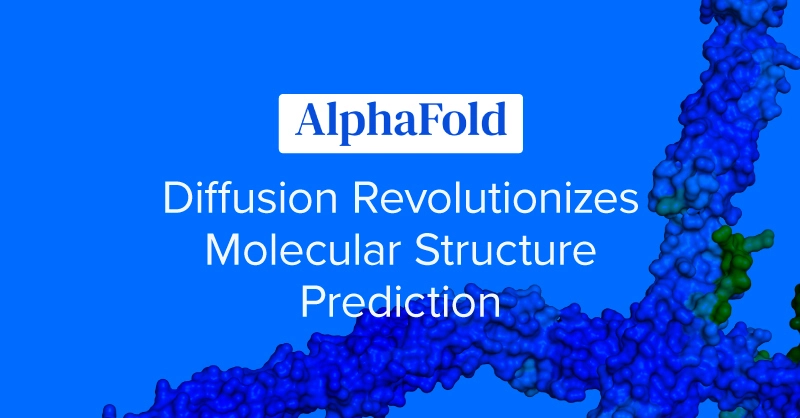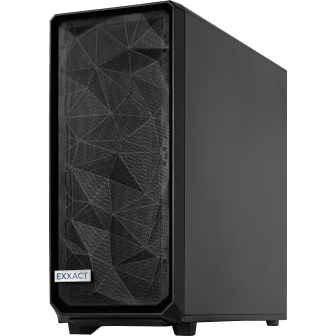
Major AlphaFold Update Boosts Discovery Capabilities
The folks at Google DeepMind and the Isomorphic Labs unveiled AlphaFold 3, the successor to AlphaFold 2, which employs a novel diffusion-based architecture to accurately predict, fold, and model the structure of not just proteins but also complexes that include proteins, nucleic acids, DNA and RNA, small molecules, ions, and modified residues.
Diffusion has gained its popularity in the generative AI boom where text to image generation AIs employed a similar technique where the model iteratively predicts/generates an image from noise (super pixelated mess, not the sound).
Demis Hassabis, CEO of DeepMind, recognizes the impact AlphaFold 2 had on structural biology of individual proteins, unlocking all kinds of amazing research. The goal of AlphaFold 3 is to now understand the dynamic nature of biology and structural biology of interaction between different molecules and proteins.
Not Just for Proteins
AlphaFold 3 not only predicts protein to protein interactions but how proteins interact with other biomolecules. This not only includes how proteins interact with DNA but how proteins can potentially interact with cancer cells.
Alongside the debut of the new AlphaFold 3 model is the AlphaFold Server, a user-friendly tool that allows non-commercial researchers to use AlphaFold 3 through a portal. With just a few clicks, biologists can generate large and complex protein structures that have previously been challenging to predict quickly and accurately.
Diffusion Based Deep Learning Architecture
Diffusion-Based Deep Learning Architecture: Unlike its predecessor AlphaFold 2, AlphaFold 3 employs a diffusion-based architecture that models the generation of atomic coordinates directly. This generative approach allows for highly accurate modeling of different types of biomolecular interactions without the need for excessive specialization for different molecular components.
However, diffusion models suffer from the possibility of hallucinations where models generate plausible structures but, in reality, do not represent a real molecule. AlphaFold 3 implements a cross-distillation algorithm with predictions made from AlphaFold-multimer v2. By recalling past models, AlphaFold 3 can predict more accurate and reliable generations.
Will AlphaFold 3 be Open Source?
Currently, AlphaFold 3 source code is not available on a GitHub repository and only accessible through the AlphaFold Server. AlphaFold v2.3 is the latest update on the AlphaFold GitHub for open-source download and while there’s no official plan to release AlphaFold 3 to the public, Pushmeet Kohli, VP of Research at Google DeepMind, tweeted this:
We love the excitement & results from the community on AlphaFold 3 and are doubling the AF Server daily job limit to 20. Happy to also share that we're working on releasing the AF3 model (incl weights) for academic use, which doesn’t depend on our research infra, within 6 months.
— Pushmeet Kohli (@pushmeet) May 13, 2024
While you cannot run AlphaFold 3 on your own machine, AlphaFold 2 is still available and a staple in any life science research lab. Checkout their Github here. Running AlphaFold 2 on your own hardware is simple and the addition of a GPU can accelerate your results faster than running on Colab.
If you have any questions on how you can configure your system preloaded with simulation suite, AlphaFold, or cryo-EM software, contact us today.

We're Here to Deliver the Tools to Power Your Research
With access to the highest performing hardware, at Exxact, we can offer the platform optimized for your deployment, budget, and desired performance so you can make an impact with your research!
Talk to an Engineer Today
AlphaFold 3 - Diffusion Revolutionizes Molecular Structure Prediction
Major AlphaFold Update Boosts Discovery Capabilities
The folks at Google DeepMind and the Isomorphic Labs unveiled AlphaFold 3, the successor to AlphaFold 2, which employs a novel diffusion-based architecture to accurately predict, fold, and model the structure of not just proteins but also complexes that include proteins, nucleic acids, DNA and RNA, small molecules, ions, and modified residues.
Diffusion has gained its popularity in the generative AI boom where text to image generation AIs employed a similar technique where the model iteratively predicts/generates an image from noise (super pixelated mess, not the sound).
Demis Hassabis, CEO of DeepMind, recognizes the impact AlphaFold 2 had on structural biology of individual proteins, unlocking all kinds of amazing research. The goal of AlphaFold 3 is to now understand the dynamic nature of biology and structural biology of interaction between different molecules and proteins.
Not Just for Proteins
AlphaFold 3 not only predicts protein to protein interactions but how proteins interact with other biomolecules. This not only includes how proteins interact with DNA but how proteins can potentially interact with cancer cells.
Alongside the debut of the new AlphaFold 3 model is the AlphaFold Server, a user-friendly tool that allows non-commercial researchers to use AlphaFold 3 through a portal. With just a few clicks, biologists can generate large and complex protein structures that have previously been challenging to predict quickly and accurately.
Diffusion Based Deep Learning Architecture
Diffusion-Based Deep Learning Architecture: Unlike its predecessor AlphaFold 2, AlphaFold 3 employs a diffusion-based architecture that models the generation of atomic coordinates directly. This generative approach allows for highly accurate modeling of different types of biomolecular interactions without the need for excessive specialization for different molecular components.
However, diffusion models suffer from the possibility of hallucinations where models generate plausible structures but, in reality, do not represent a real molecule. AlphaFold 3 implements a cross-distillation algorithm with predictions made from AlphaFold-multimer v2. By recalling past models, AlphaFold 3 can predict more accurate and reliable generations.
Will AlphaFold 3 be Open Source?
Currently, AlphaFold 3 source code is not available on a GitHub repository and only accessible through the AlphaFold Server. AlphaFold v2.3 is the latest update on the AlphaFold GitHub for open-source download and while there’s no official plan to release AlphaFold 3 to the public, Pushmeet Kohli, VP of Research at Google DeepMind, tweeted this:
We love the excitement & results from the community on AlphaFold 3 and are doubling the AF Server daily job limit to 20. Happy to also share that we're working on releasing the AF3 model (incl weights) for academic use, which doesn’t depend on our research infra, within 6 months.
— Pushmeet Kohli (@pushmeet) May 13, 2024
While you cannot run AlphaFold 3 on your own machine, AlphaFold 2 is still available and a staple in any life science research lab. Checkout their Github here. Running AlphaFold 2 on your own hardware is simple and the addition of a GPU can accelerate your results faster than running on Colab.
If you have any questions on how you can configure your system preloaded with simulation suite, AlphaFold, or cryo-EM software, contact us today.

We're Here to Deliver the Tools to Power Your Research
With access to the highest performing hardware, at Exxact, we can offer the platform optimized for your deployment, budget, and desired performance so you can make an impact with your research!
Talk to an Engineer Today
